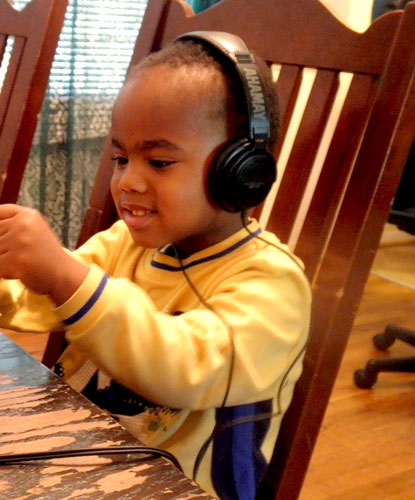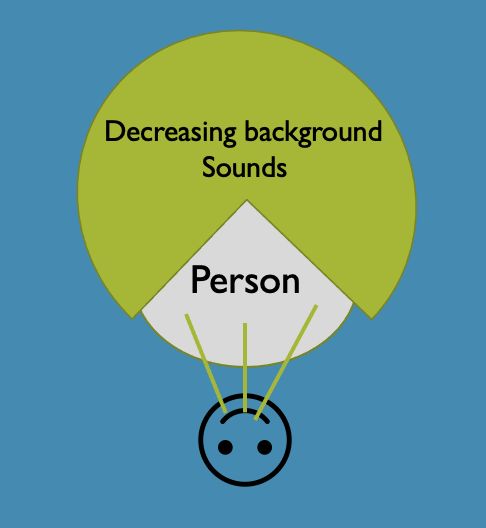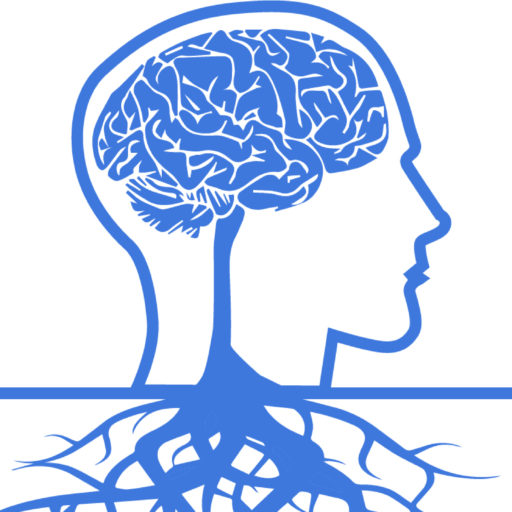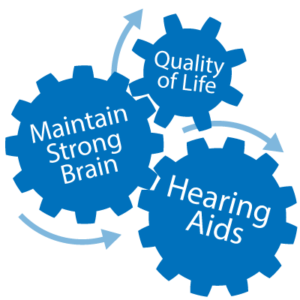Hearing Loss with Sound Intolerance
Untreated hearing loss under-stimulates auditory neural pathways resulting in hearing loss with sound intolerance. Sadly, hearing loss increases the risk of emotional and behavioral difficulties in children and teens. Likewise, adults experience emotional and social difficulties.
Is Hearing Loss Affecting You?
Your Moore Auditory-Visual Questionnaire Report shares intensity of behavioral difficulties related to specific areas of concern improving communication with Cheri, professionals, doctors, and therapists.
Need Help?
Cheri Moore helps children and adults with hearing loss and sound intolerance strengthen their hearing system resulting in an easier transition into hearing aids. In addition, Cheri completes observation activities to learn about your visual processing skills.
It is an honor to work with Cheri Moore on her journey with auditory integration therapy. She has shown a consistent desire to go above and beyond in every aspect of her practice and training. Cheri’s quest for greater understanding and her thirst for knowledge are demonstrated daily. It is a pleasure to work with a professional who is so eager to learn and apply new information to help her clients reach their best possible outcomes.
Kathy J Harvey-Jones, MsEd, Audiology, BC-HIS
Through this video, learn how hearing loss affects your balance, memory, conversational skills, and even your vision.
Sound Sensitivities, Ear Pain
When your auditory neural system is weak, loud sounds cause a painful feeling in the ear. Because weak auditory pathways fail to stimulate a nerve that fires the middle ear’s stapedius muscle. Consequently, loud sounds cause physical pain in the ear. Yes, there is actual knife-like pain in the ears.
The stapedius muscle’s job is to protect the cochlea from harmful levels of sound. Specifically, by pulling a tiny bone called the incus away from the cochlea. When there are safe levels of sound, the tiny incus bone taps on the cochlea sending sound energy to the brain.
Behaviors are clues. When the stapedius muscle fails to stop harmful levels of sound, individuals become anxious. Especially when they walk into stores, malls, and eateries. Why? They never know when a sound will hurt their ear. Continuous stress behaviors result in another domino effect, an imbalance of stress hormones within the brain.

Overcoming CAPD with Autism
My daughter was diagnosed with autism and central auditory processing disorder (CAPD). We schooled her at home, and even with my background in teaching, it was very difficult. I would have to fight with her to make her begin her school work. While teaching her, she...
A Future for My Daughter: Diminishing L.D. / Sound Sensitivities
Ashylyn did not talk much when she was little and was shy about interacting with people. I sent her to a private Christian school for kindergarten hoping she would come out of her shell. Unfortunately, there were more problems than just shyness. I remember feeling...
CAPD Diagnosis at 21 years; Success with Hearing Aids and AIT
Finding out that my 21-year-old son had a hidden hearing loss (CAPD) was a relief. He is very intelligent. Not getting the right help was causing feelings of depression and hopelessness. Finally, an answer to the questions I have had for so long! He never really fit...
A Relieved Grandmother: CAPD Success with Hearing Aids
I was at my wit’s end when I met Cheri Moore. My oldest granddaughter, whom I had guardianship, had been tested for every possible psychological learning disability, including autism. She was prescribed medication, which did not seem to help. Still, no diagnosis. I...
A Mother’s Journey Into the World of Dyslexia
Diagnosing Dyslexia During the spring of 2007, I attended Dianne Craft’s conference where I learned that dyslexia affected the auditory processing center and the visual processing center. Perhaps I had found help for my daughter’s reading and spelling struggles. She...

Hearing Loss with Sound Intolerance
Auditory Integration Training improves sound tolerance helping clients more easily adjust to wearing hearing aids. Understandably, clients with sound intolerance resist the idea of wearing hearing aids. Today, hearing aids are more like sound adjustors. Because phone apps pair up with your cell phone allowing you to adjust sounds around you. For example, you can turn down competing sounds around you. At the same time, you can turn up the volume of sound directly in front of you improving your ability to hear the person talking.
Negative Impact on Motor Skills
Suprisingly, a study completed by Frank Lin at John Hopkins’ Univ. School of Medicine in 2012, found that participants with a mild 25 dB hearing loss were three times more likely to have fallen in the past. Astonishingly, the risk of falling increased almost one and a half times for every ten-decibel increase in hearing loss.
- SPEECH — Lip, tongue, and cheek movement need auditory stimulation.
- BALANCE & MOTOR PLANNING comes from the inner ear’s vestibular system coordinating head, neck, and eye movements needed for depth perception.
After Cheri started working with adults with hearing loss, she consistently checked their ability to keep vision single and clear. Suprisingly, all adults fatigued while reading. Using a brock string with four beads, these clients experienced vision that blurred and doubled at near or far. Intrigued, Cheri gave them a full auditory integration training program. Once again using the brock string, these clients shared that vision stayed clear and single. Consequently, almost all clients started consistently wearing hearing aids.
Take action, complete a Moore Auditory-Visual Questionnaire. Then, contact Cheri Moore. If you know you have hearing loss and need financial help, Cheri can help connect you with nonprofit organizations that help with the cost of hearing aids.
Poor Emotional Health
Research shows that preschoolers, children, and teens with hearing loss have an increased risk of developing emotional distress and behavioral difficulties. Likewise, researchers at John Hopkins found that adults with untreated hearing loss are at an increased risk of developing depression and social isolation. When it becomes too difficult to enjoy group conversation, the person with hearing loss withdraws. Despondent, the person feels left out. Unfortunately, isolation occurs at home and away from home.
- Anger, frustration
- Communication difficulties
- Feelings of isolation, choice to isolate
- Depression, hopeless
- Listening difficulties resulting in poor job and academic performance


First, Berard Auditory Integration Training strengthens your hearing system improving sound tolerance. Then, Auditory Neurocognitive Training improves memory, auditory processing speed, and listening skills. Overall, all ages experience improved emotional health.

Decreasing Cognitive Skills
John Hopkins completed a longitudinal study tracking the effects of aging. When compared to participants without hearing loss, researchers found that participants with hearing loss suffered from dementia at a higher rate. Alarmingly, the onset and progression of dementia was more rapid in participants who refused to wear hearing aids. Encouragingly, the progression of dementia slowed after participants started wearing hearing aids. When a hearing test shows a mild hearing loss, Cheri strongly recommends hearing aids. If you already have sound intolerance, work with Cheri to complete an auditory integration training program. Thus far, all clients Cheri has worked with are successfully wearing their hearing aids.
In summary, the risk of developing dementia is
- Two times more likely when participants had mild hearing loss
- Three times more likely when participants had moderate hearing loss
- Five times more likely when participants had severe hearing loss.
Hearing Aids Maintain One’s Quality of Life
Yes, hearing aids are expensive. However, your quality of life depends on good cognitive functions. Thus, hearing aids are worth the cost. In fact, your independence, social life, and success at work depends on your hearing. Hearing aids, when properly fit and consistently worn, maintain stimulation to your brain needed for:
- Short-term memory
- Enjoying conversations in all environments
- Integrating sounds with sights promoting motor planning, balance
- Maintaining speech fluency, word retrieval
Researchers found that pushing sound stimulation with hearing aids to the brain slowed the decline of memory difficulties by 75 percent.


Overcoming CAPD with Autism
My daughter was diagnosed with autism and central auditory processing disorder (CAPD). We schooled her at home, and even with my background in teaching, it was very difficult. I would have to fight with her to make her begin her school work. While teaching her, she...
A Future for My Daughter: Diminishing L.D. / Sound Sensitivities
Ashylyn did not talk much when she was little and was shy about interacting with people. I sent her to a private Christian school for kindergarten hoping she would come out of her shell. Unfortunately, there were more problems than just shyness. I remember feeling...
CAPD Diagnosis at 21 years; Success with Hearing Aids and AIT
Finding out that my 21-year-old son had a hidden hearing loss (CAPD) was a relief. He is very intelligent. Not getting the right help was causing feelings of depression and hopelessness. Finally, an answer to the questions I have had for so long! He never really fit...
A Relieved Grandmother: CAPD Success with Hearing Aids
I was at my wit’s end when I met Cheri Moore. My oldest granddaughter, whom I had guardianship, had been tested for every possible psychological learning disability, including autism. She was prescribed medication, which did not seem to help. Still, no diagnosis. I...
A Mother’s Journey Into the World of Dyslexia
Diagnosing Dyslexia During the spring of 2007, I attended Dianne Craft’s conference where I learned that dyslexia affected the auditory processing center and the visual processing center. Perhaps I had found help for my daughter’s reading and spelling struggles. She...


